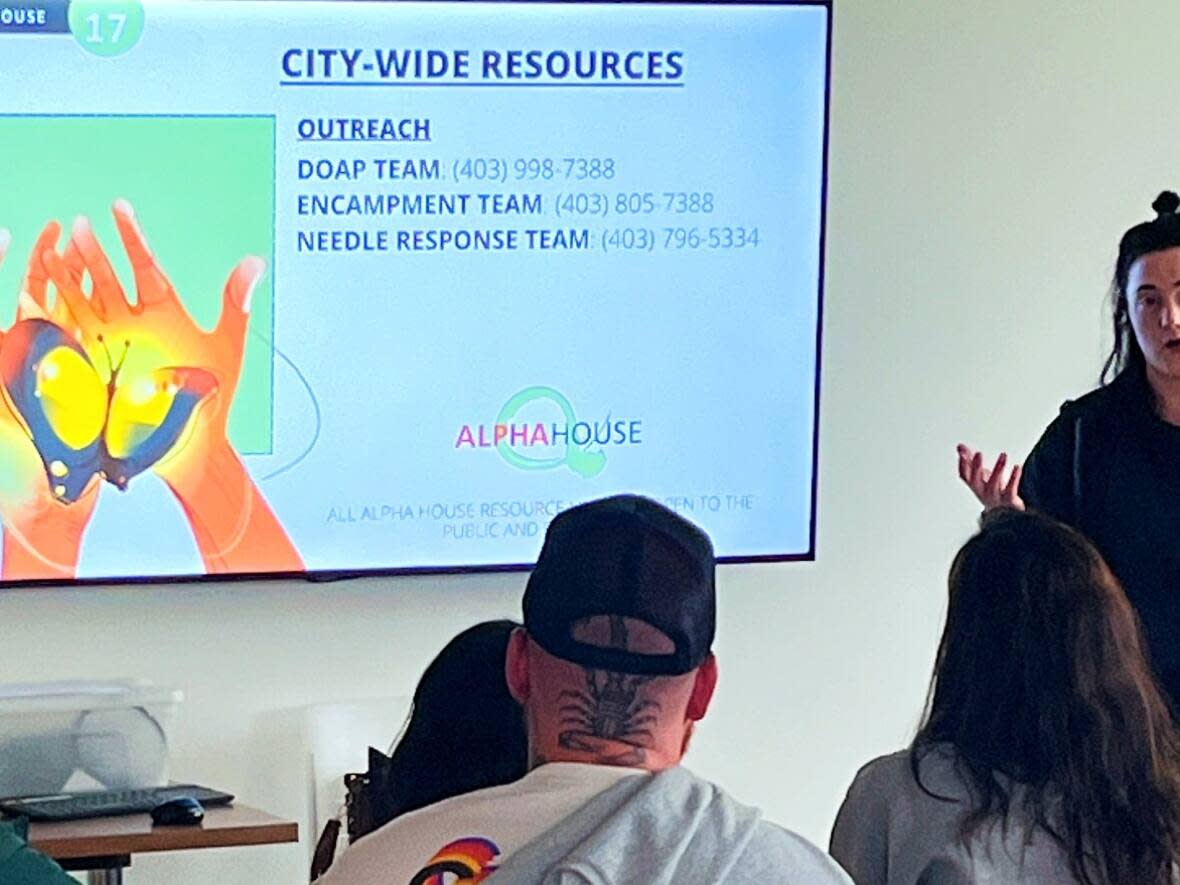Alpha House offers advice on how to interact with people fighting homelessness

Melissa Gardner always makes a point of interacting with the individuals she encounters on the streets of Calgary, hoping to spread some positivity with kindness and a smile.
Gardner's mission is simple — she wants to talk to those tackling homelessness with sensitivity and empathy.
"People are just pleased to have someone look them in the eye and say, hello," she said.
Gardner, a volunteer at the Calgary Community Fridge, was one of the participants at a workshop organized by Alpha House on Wednesday called, "Engaging Vulnerable Persons."
Alpha House, which runs a shelter, temporary housing and other services for people struggling with homelessness and addiction in Calgary, is keen to shatter common stereotypes associated with homelessness by spreading awareness through regular workshops.
The sessions give participants a chance to understand the complexities associated with homelessness and how to best tackle a crisis situation.
"Alpha House runs the Engaging Vulnerable Persons training or workshop really to connect with groups and individuals in the community who have maybe some hesitation around, you know, seeing homelessness," said Shaundra Bruvall, communications and program manager at Alpha House.
She added that the workshop can help more people feel at ease when interacting with individuals they might encounter on the streets.
Alpha House currently organizes two workshops a month in partnership with local non-profit Carya Village Commons in southeast Calgary. The sessions are free and open to all members of the public.
Bruvall and her team have been offering the workshops for a couple of years and try to tweak them as needed. For instance, if a group of individuals is relatively familiar with homelessness, Alpha House staff members modify the workshop to ensure it stays relevant for participants.
"We found the increase in visibility of homelessness and public substance use has really brought it back into the forefront and we're getting more and more requests for this training," said Bruvall, who also organizes private sessions for businesses looking to train their staff.
Workshop challenges harmful stereotypes
According to Bruvall, the workshops benefit individuals dealing with homelessness in more ways than one and help challenge common misconceptions.
Bruvall said that individuals tackling homelessness often have to deal with negative stereotypes that make them "feel like everyone is afraid of them" or they are "looking down on them."
The solution? Busting common myths by directly engaging with the public and humanizing the cause.
"We can have an impact for our clients on improving basically public perception of them … and recognizing their humanity," said Bruvall.

For Gardner, attending Wednesday's workshop proved to be a rather insightful experience.
She said the session listed several helpful strategies and made her realize that she is on the right track.
"I'm not off doing something that I shouldn't be doing or … interacting with people in a way that would be negative for them," she said.
Tips for how to interact
If you're wondering what's the best way to interact with those struggling with homelessness, Bruvall has the answer.
Body language is crucial, according to Bruvall, and can have "a really important influence on your interaction with somebody."
She suggests staying relaxed while approaching someone and reminding yourself to be compassionate.
"You can almost tell your tell your mind that you know, yes, I need to be aware of the situation but that there's nothing inherently dangerous about passing somebody on the street who is rough sleeping or who does look like they're experiencing homelessness," she said.
Bruvall also recommends doing a "wellness check" and pausing to ask someone how they're doing. It's a small gesture that can go a long way.
Other tips that can be helpful include watching your tone and finding common ground with others. It can be as simple as talking about the weather.
"Finding that commonality again is really helpful in terms of our perception and our compassion for folks on the street and it also has a huge impact then on the person that we're interacting with," Bruvall said.
She also recommends respecting an individual's personal space and recognizing when they don't want to engage in a conversation.
"They should have as much agency in the decision to interact as you should have, right," Bruvall added.
'We never want to normalize homelessness'
While Bruvall and her team members want to encourage community involvement as much as possible in order to destigmatize homelessness, they don't want to send out the wrong message.
"We never want to normalize homelessness. There's nothing normal about somebody sleeping outside," Bruvall said.
"But what we really want people to just slowly start to engage with is that there's complexities around this and nothing's black and white."


